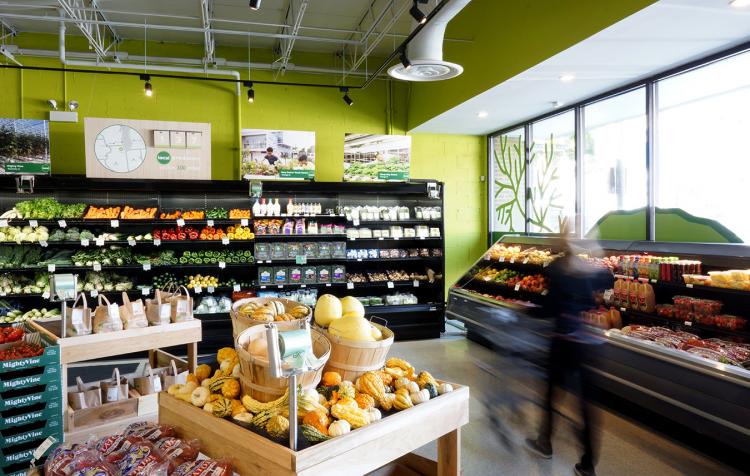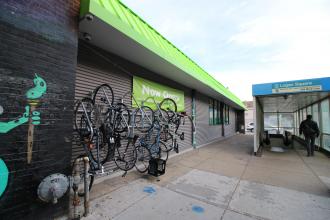Dill Pickle Food Co-op:


My, how you’ve grown!
When Dill Pickle opened its Chicago store in late 2009 with 1,100 square feet of retail space, the co-op expected first year sales of about $650,000. At nearly $600/sq. ft. annually, that sales level would have been more than respectable. Then what do you say when sales come in at $1.3 million?
Clearly, the co-op had found a neighborhood that loved them. Dill Pickle had 400 owners on the day it opened, and 100 more joined in just the first week of business. The co-op was in danger of outgrowing its space before the paint was dry.
As annual sales rose to over $1.8 million, the space limitations of the co-op's facility became insurmountable. Planning for a larger store began in 2013, the co-op’s fourth year.
Working with design/build firm
Moss, an architecture and design studio in the co-op’s Logan Square neighborhood, helped the co-op set up community input sessions on design elements, including appropriate department sizes and community space, then integrated those choices within the confines and physical requirements of the building. Laura Cripe (Moss principal) and Matt Nardella (architect) were both fans of grocery co-ops and had approached Dill Pickle about working with them when the co-op was planning its first store. Their insights helped create a workable layout for that small storefront.
When it was time to start planning for a new site, Moss worked with the co-op to find an optimal building that could be transformed to a much larger grocery store, one that was convenient to public transit. The chosen site and adaptive-reuse design were full of interesting challenges, and a spacious, blank-slate layout meant there were many design options. The general contractor, InFocus Builders, completely gutted the interior, constructed sturdy walls, adding sliding doors and several coats of colorful paint.
Bringing in natural light with large storefront windows and adding attractive light fixtures were key to creating the best shopping experience possible. An on-site kitchen, impossible at the coop’s former space, has paved the way for hot and cold prepared foods—and the dining area doubles as a community meeting space.
Pressure cooker real estate
As with most major expansions, it took time to find the right location and to raise $3.5 million needed to fund the project. There were the nearly inevitable delays, starting with finding and securing the site. In the very tight commercial real estate market of Chicago, Dill Pickle did not have the luxury of a contingent lease, and once the co-op settled on the new Milwaukee Avenue location in 2015, it had only three months without rent and five more months at reduced rent before paying full price for its empty building.
Every succeeding month added an estimated $20,000 to the startup costs. National Co+op Grocers' Development Co-op was engaged after the lease was signed and began assisting Dill Pickle with the capital campaign and site plans.
The co-op raised almost $1 million in owner loans. Dill Pickle also lined up funding from Shared Capital Cooperative and a major loan from the Chicago Community Loan Fund.However, closing on the latter Fund's $1.7 loan was a slow process, lengthening the timeline. Still needing $400,000 in capital commitments, the co-op turned to the Local Enterprise Assistance Fund (LEAF) to make up part of this shortfall, and with the help of National Co+op Grocers raised $150,000 in loans from sister co-ops, which was matched by the NCG Development Co-op loan fund.
Presto—parking!
The co-op had started some structural work on its building even before the startup capital was fully committed—feeling that they needed visible progress to keep co-op owners engaged and to strengthen the loan drive. Among the earliest tasks was the removal of part of the building to create room for six parking spaces: the only six!
In most markets, such a lack of parking would be unthinkable. But Dill Pickle is located in a high-density urban area where parking is limited and shoppers are used to getting around by foot, bike, and mass transit. The co-op has installed as many bike racks as space allows, it is on a major bus line, and it has a subway (“L”) line so close that people in the store can hear the trains go by. Dill Pickle’s general manager, Sharon Hoyer, says that nobody
even realized the parking spaces were there until recently, and only half the spaces are typically in use.
Once renovation began in earnest, Dill Pickle was able to keep up with a very aggressive timeline set by the NCG Development Co-op. The co-op completed the work with only one extra week and $2,000 below budget.
Local hiring
With the new store open a half year, Hoyer reports that sales are within about 5 percent of projections ($6.5 million in the first year), and everyone is working hard to deal with the inevitable growing pains. Staffing grew from 14 employees to 43 almost overnight.
The co-op is proud of its recruitment effort, which emphasized access and diversity. Dill Pickle worked with the Center for Changing Lives (CCL) to conduct a hiring fair, where they interviewed and screened 120 people. From that group they filled almost all the new positions and exceeded the co-op’s diversity goals.
Staff turnover has been much less than projected, but it still adds to the workload of running a larger store. Hoyer plans to offer coaching for staff (coaching is also provided by CCL) to help aid retention. In meeting its goals to better reflect and serve the needs of its community, Dill Pickle has also added some conventional products and lower-priced options to the store's grocery mix.
Dill Pickle has projected 10–12 percent growth over the first two years in its new store, but the co-op has not (yet) begun planning for its next expansion. •
Successful Startups
Dill Pickle is not the only “Third Wave” startup food co-op that has seen great success. Here are some of the others:
Monadnock Food Co-op: Keene, N.H. opened in 2013 with sales of $6M. Now $12.5M, planning major expansion. Over 3,000 owners.
Friendly City Food Co-op: Harrisonburg, Va. opened in 2011 with sales of $2M. Now at $4.3M, planning expansion. Over 1,900 owners.
Durham Market Co-op: Durham, N.C. opened in 2015 with sales of $4 million, now at $6M. Over 4,000 owners.
River Valley Co-op: Northampton, Mass. opened in 2008 with sales of $7.4M, now at over $28M. Planning second store of similar size. Over 9,500 owners.
Eastside Food Co-op: Minneapolis, Minn. opened in 2003 with sales of $2M. Completed a $6M expansion in 2016. 2017 sales of $14M. Over 7,000 owners.
Just Food Co-op: Northfield, Minn. opened in 2004 with sales of $2.7M, now at $5.2M. Planning major expansion. Over 3,000 owners.
Great Basin Community Food Co-op: Reno, Nev. opened tiny storefront in 2006. Moved to 500 sq. ft. location in 2008. Moved again to larger location in 2012. Over 8,000 owners.
Photo courtesy of Moss Architect and Dill Pickle Food Co-op







